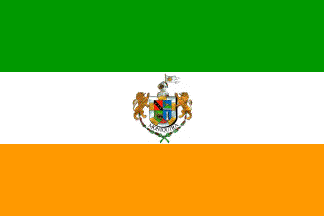
image by Ivan Sache, 29 September 2008

Last modified: 2008-10-11 by dov gutterman
Keywords: boyaca | moniquira |
Links: FOTW homepage |
search |
disclaimer and copyright |
write us |
mirrors

image by Ivan Sache, 29 September 2008
See also:
Moniquirá is a municipality in the Colombian Department of
Boyacá, part of the the subregion of the Ricaurte Province.
The flag of Moniquirá is
horizontally divided green-white-guave and is charged with the
coat of arms
Source: municipal
web site
Dov Gutterman, 18 September 2008
Translated from municipal
web site
"The municipality shall have its own flag, symbolizing the
history of our small homeland. The flag shall be respected since
it represents the culture and customs, and, in general, the
feelings of the inhabitants of Moniquirá.
The flag is made of three horizontal stripes, green, guava and
white.
Green represents the fertile lands and valleys, producing
abundant natural resources, surrounded by rivers and a diversity
of water resources;
Guava represents the abundance of this crop;
White represents peace, tranquillity and purity of its
people."
The photograph of the flag shows the stripes as arranged
green-white-guave, with the coat of arms in the middle.
"By Decree No. 018 of 1999, the municipal coat of arms of
Moniquirá was adopted as the distinctive symbol and physic
emblem of the Moniquirá territory.
The coat of arms of Moniquirá is of Spanish shape, quartered by
a cross with a triangular escutcheon in base. The border is
compony of ten pieces, five or and five argent. The shield is
surmonted by the helmet of the Grand Warrior, with, as the crest,
a swallow-tailed flag charged with a sun. The supporters are two
lions rampant surmonting coffee branches.
The quarters are represented as:
I. Gules a bend sable charged with three mullets or;
II. Azure in base wavy azure and argent a palm plantation and
mountains vert a rising sun;
III. Vert trapiche* wheels and a sugarcane, all or;
IV. Azure an obelisk or.
Escutcheon gules a copper miner's pan.
The symbolic is as follows:
I. On a red field, synonym of victory with blood shed, is shown a
black bend with the three stars representing the rank of Captain
Antonio Ricaurte**, a hero of the Granadine period born in the
Province whose capital is Moniquirá.
II. Represents the name of Moniquirá, in Chibcha "the Town
of the Baths", above river Moniquirá, the palm plantation,
the mountains, the sun and the celeste blue of the sky.
III. On the green of its rural hamlets ("veredas"), the
symbol of the farmers' work as the grinding of sugar cane*.
IV. The obelisk as a symbol of confraternity, integrity and
Bolivarian unity, made by Eduardo Malagón Bravo***.
The escutcheon is charged by a copper miner's pan, symbolizing
"Ciudad Dulce de Colombia", copper representing the
mines of the municipality. The componed border represents the
richness and integrity of the ten municipalities forming,
together with Moniquirá, the Province of Ricaurte: Arcabuco,
Santana, San José de Pare, Chitaraque, Togüí, Santa Sofía,
Sutamarchán, Ráquira, Sáchica and Villa de Leyva, craddle of
the great hero of San Mateo, Antonio Ricaurte**.
The shield is surmonted by the helmet of the Grand Warrior,
Antonio Ricaurte**, who shall live for the posterity and fly the
flag of greatness, wisdom and glory.
The two lions supporting the shield are the symbol of the
strength of the inhabitants. The coffee branches with flowers and
berries recall that Moniquirá is the first coffee producer in
the Department of Boyacá."
* a "trapiche" is a cog wheel used to grind sugarcane
and ore.
** Antonio Ricaurte was born in Vila de Leyva in 1786 and died
heroically in the battle of San Mateo, Venezuela in 1814. During
the battle, Ricaurte immolated himself by lighting a barrel of
gunpowder, killing a lot of Royalist soldiers and allowing
Bolivar to regain control of the place and win the battle.
Ricaurte's sacrific is recalled in the national anthem of
Colombia: "Ricaurte in San Mateo, in atoms flying, 'Duty
before life', with flames he wrote."
*** Honorary member of the Magdalena Bolivarian Society, also the
author of the municipal anthem of Moniquirá, of the flag and
arms of Sutamarchan, of the modernization of the coat of arms of
Santa Sofiá.
Ivan Sache, 29 September 2008
byrmo.jpg)
image from municipal
web site